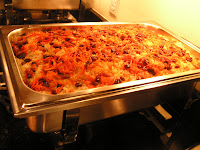As explained in the Introduction, the anbuulo in the Somali Cuisine cookbook is one of those dishes in which the main ingredient is substituted for the indigenous one. The original main ingredient is made from corn or sorghum that undergoes much processing. The closest substitute is white hominy; fortunately hominy is as good as the original ingredient.
Canbuulo
1 cup of white hominy (dry, not canned)
½ cup of dry red chori beans or small red beans
7 cups of water
Salt to taste
Wash and clean the white hominy very well. Bring 4 cups of water to boil in a heavy pan. Add the clean white hominy and cook on a medium heat for 20 minutes. Drain all the water and wash the white hominy again, rubbing the white hominy between the palms of your hands to remove the starch.
Wash the kidney beans and mix them with the white hominy. Bring the remaining 3 cups of water to boil and add it to the mixture. Cook on a medium heat for about 40 minutes. After 40 minutes, if the canbuulo is not tender, add a little more water and cook until it is tender.
Bun
Bun is made of fried whole coffee beans and it is often used for spiritual purposes. In some Somali regions, Bun is often prepared on Wednesdays and Fridays, as it is believed that angels descend on those days. Bun is not a dish on its own and should be served with canbuulo or the canbuulo-family such as barley, beans or with popcorn.
1 cup clarified butter, olive oil or vegetable oil
1 handful of whole coffee beans
Wash the whole coffee beans very well. Using the tip of a fork or a knife, puncture little holes in the whole coffee bean (this prevents the beans from popping when frying).
Heat the butter or the oil in a heavy saucepan on a medium heat. Dry the whole coffee beans and add into the hot oil. Let them fry for 3-4 minutes, and then take out from the heat and transfer to another bowl (when frying, be careful with the hot oil and make sure you do not introduce water into the saucepan).
Best served with olive oil and honey (or sugar).










